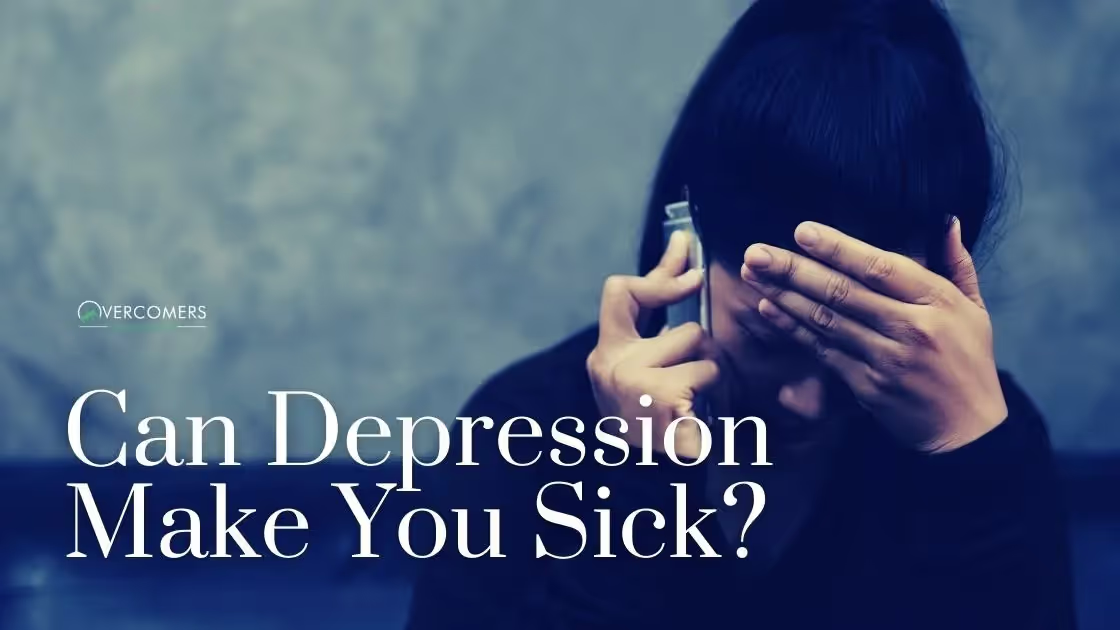If you're wondering can depression make you sick? The answer is yes. Depression can make you very sick.People typically associate depression with emotions:...

If you're wondering can depression make you sick? The answer is yes. Depression can make you very sick.
People typically associate depression with emotions: overwhelming feelings like sadness, loneliness, emptiness, and hopelessness.
But, depression doesn't just affect your emotions. It also affects your physical body.
And, some of the emotional and psychological effects are caused by the physical changes that depression creates in your body.
Your brain, body, and emotions all come together to form a whole you.
If one is affected, then the rest are affected.
Understanding how depression can make you sick is the first step.
This article details some of the ways in which depression affects your body and can make you sick.
Research shows that depression and inflammation are highly linked, although which causes are still unknown.
This means that if you're struggling with depression, you are probably also dealing with inflammation.
Treating inflammation may even lessen your overall symptoms of depression.
Of course, inflammation affects your whole body's ability to function.
Some research shows that inflammation (even that caused by depression) can lead to the development of other issues such as heart disease, cancer, and type-2 diabetes.
Depression has also been shown to reduce your body's level of immunity.
Your immune system is the way that your body protects itself.
People with impaired immune systems are more likely to get sick and to stay sick for longer periods of time.
Many people with depression also experience heart issues and high blood pressure.
Research shows that depression is more common in people with high blood pressure.
Depression can also lead to more serious cardiac issues such as damage to the arteries and irregular heart rhythms.

Your brain affects all parts of your body; however, the brain is directly linked to your gastrointestinal system (GI).
This means that depression causes stomach issues by affecting you GI tract's ability to move and contract which causes nausea, constipation, and diarrhea.
If you've been noticing disruptions to your bowel movements or been experiencing stomach pain, it could be depression.
Research shows that our emotions and moods affect our production of acid in the stomach.
This means that you might be more likely to develop ulcers or acid reflux.

Everyone knows that one of the most common symptoms of depression is disruptions to your normal sleep patterns.
The body of evidence that depression affects sleep is undeniable.
For example, those who suffer from depression are most likely to experience insomnia and those who have insomnia are also very likely to develop depression.
When you're asleep, your immune system is supposed to produce substances to fight infection and illness.
When you're depressed, your weakened immune system loses this ability.
This means that when depression causes you to lose sleep, it increases your chances of getting sick.
Depression has also been shown to affect appetite, hunger, and weight.
Studies show that your mood has a big impact on your diet.
Depression hits appetite at both ends of the spectrum.
Some people who experience depression have a loss of appetite.
This leads to rapid weight loss.
For other people with depression, their lowered mood could cause them to make poor dietary choices, lose interest in exercise, and binge eat to mask the uncomfortable emotions that depression causes.
Research also shows a link between obesity and depression.
Although it is still unclear which causes which, 40% of people who are depressed are also obese.
Depression is known to cause changes to your emotions, but it can also cause physical changes to the brain.
This can result in a lack of oxygen, inflammation, and even shrinkage in the actual size of your brain.
Of course, changes to your brain affect your cognitive abilities.
This can lead to decreased memory, the ability to accomplish tasks, the ability to pay attention, and the executive skills which help you make decisions, plan, and problem solve.
According to research by the National Headache Foundation, up to 60% of people with depression also suffer from headaches.
This can be from depression-related stress and anxiety which trigger tension headaches.
People with depression are also more likely to experience frequent or severe headaches.
Research shows that depression causes pain and that pain causes depression.
One of the most common effects of depression on the body is a persistent feeling of fatigue.
This is often accompanied by a numbness throughout the whole body and/or the type of achiness that is typically associated with the flu.
Another very common form of pain that depression causes is back pain.
Many people slouch over when depressed or avoid exercise which can lead to muscle stiffness and pain.
Depression has also been shown to result in joint pain.
This may be from increased inflammation discussed earlier in the article.
People with depression are also likely to be less active which can cause stiff joints that become painful over time.
Stretching is something you can start doing right away to combat the pain caused by depression.
Stress reduction has also been shown to have a positive impact on pain.
Yes, depression can make you sick.
If you're suffering from some of the physical effects described in this article, they may be being caused by your depression.
But, don't worry.
If depression is making you sick, then treating your depression is the fastest way to get well.
You can take steps to lessen some of these effects now, but treating your depression should come first.
The duration of depression counseling varies for each individual, depending on the severity of their depression and their progress in therapy. Our therapists will regularly assess your progress and adjust your treatment plan as needed.
Ignoring depression can exacerbate symptoms and make it more challenging to manage over time. This can result in a negative impact on your personal, professional, and social life, leading to feelings of isolation and even thoughts of self-harm or suicide.
Yes! In fact, it's encouraged that you open up to your therapist so they can gain deeper insight into your individual situation and develop the most effective treatment plan possible that works best for you. Your therapist is there to serve as an unbiased source of support who will respect any thoughts or feelings shared within the session without judgment or criticism.
Addressing depression is crucial because it can significantly impact your quality of life, overall well-being, and ability to function in daily activities. Left untreated, depression can lead to more severe mental health issues, relationship problems, and physical health complications.
There are many helpful resources available, including support groups, online forums, books and websites dedicated to mental health and wellness. Connecting with other people struggling with the same issue can be especially beneficial. Additionally, talking to a trusted friend or family member can provide much-needed social support during difficult times.
Therapy provides many benefits for people battling depression. Research has shown that cognitive-behavioral therapy (CBT) is particularly effective in managing depressive symptoms. In addition, therapy can teach healthy coping skills and provide emotional support during difficult times. It may also be used as part of a comprehensive treatment plan which includes medication as well as lifestyle changes such as regular exercise and improved nutrition.